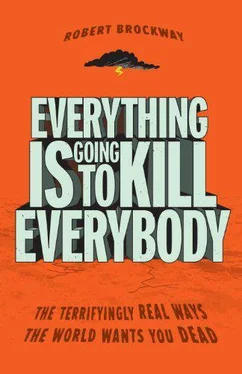Really.
That’s not a nickname made up by their opposition; Monsanto themselves named their product “Terminator.” It’s like they’re flaunting their potential supervillainy! In the realm of terror-inspiring corporate decisions, that’s right up there with naming your headquarters Death Mountain, and awarding Employee of the Week to Hitler’s-Brain-in-a-Robot. Terminator Technology isn’t just an unfortunate name, however: It really is every bit as worrying as the moniker implies. It refers to genetically modified plants that produce only sterile, dead seeds, and so cannot ever reproduce naturally. Monsanto hopes to eventually replace all of its agricultural seed sales with this technology, thus forcing all farmers to purchase new seeds from Monsanto yearly, since they’ll be unable to simply plant the seeds gathered from the previous year’s crop. The benefits to farmers using Monsanto’s new seeds must be enormous, right? Not so much! Lower prices and a slightly more stable crop. That’s pretty much it.
Better Names for Sterility-Based Plant Products
• Red Barren
• Infertile Foliage
• Impotent Potables
Oh, but the perceived benefits to Monsanto? Nothing less than the complete ownership of plant life. That sounds like the plot point to a fucking Captain Planet episode; surely it could never come to pass! The government surely must be watching and making sure that no one single private corporation could own an entire fundamental necessity of life, right? That’s like Microsoft buying “air,” or Walmart owning the patent for “shelter.” It’s so absurd that there’s no way it can slip by the authorities. And it hasn’t.
The government knows all about it.
They’ve heard about it from Michael Taylor, for one, an attorney and proponent for Monsanto as well as a current employee. He told the government all about Monsanto’s sinister plans… when President Obama appointed him to the Food Safety Working Group in 2009. Or maybe they first heard about Monsanto’s bid for domination when Michael Taylor was Deputy Commissioner for Policy at the Food and Drug Administration in the early 1990s, or maybe when he was Administrator of the USDA’s Food Safety and Inspection Service in the mid-’90s. This guy is currently one of the central points of control for the government’s oversight of genetically modified foods, and he is working for the company that wants to own the very concept of food.
So yes, the feds are well aware of Monsanto’s aspirations, and they think that’s just awesome. They probably wish they’d thought of it first, if anything.
Terminator Technology is particularly worrisome because it forces farmers to pay for next year’s seed every year. So if there’s any fluctuation in a farmer’s income—due to drought, infestation, or other unforeseen circumstances—and he can’t pay, Terminator Technology basically functions as a guarantee that there will be no crops to make up for it the following year. It’s like a ticket to go fuck yourself next season!

Act Now and Get 30% Off the Return Trip!
*Return trip does not reverse any pestilence, famine, or plague resulting from original ticket.
Valid every single year! Forever!
But hey, if you don’t buy this shit because you, like a sane person, are not exactly enthusiastic about a corporation renting your own belly out to you, then surely it doesn’t affect you….
Wrong again! Man, it seems like every rhetorical question you ask this book turns out to be wrong. It affects everybody, according to experts like Camila Montecinos, a Chilean agronomist, who says:
We’ve talked to a number of crop geneticists who have studied the [Terminator] patent. They’re telling us that it’s likely that pollen from crops carrying the Terminator trait will infect the fields of farmers who either reject or can’t afford the technology. Their crop won’t be affected that season but when farmers reach into their bins to sow seed the following season they could discover—too late—that some of their seed is sterile.
So if you, as a farmer, live near anyone who buys Terminator Technology, well, Terminator Technology then comes for you. And like Kyle Reese (who is no biologist but does have a doctorate in starring in the movie Terminator) says: “Listen, and understand. That terminator is out there. It can’t be bargained with. It can’t be reasoned with. It doesn’t feel pity, or remorse, or fear. And it absolutely will not stop, ever, until you are dead.”
Don’t tell me Kyle Reese isn’t an expert. The same principles from the movie apply to this situation: Just replace the robot with a modified gene, Linda Hamilton with all plant life on Earth, and your life with, I don’t know, that biker Arnold murders in the beginning. You don’t last long, is the general point.
OK, so even assuming all of this is going down like I said, it’s not like corporations are inherently evil. We’re all human, after all, and even the largest corporation has to have some sort of good in them. Well, if you’re still willing to trust in the moral equilibrium of a company that names its products after death machines from the future, here’s a fun fact for you: Monsanto started out manufacturing artificial sweeteners, but eventually started taking on government contracts, where they developed Agent Orange, the poorly tested, hastily deployed herbicide-turned-chemical-warfare agent used in the Vietnam War that poisoned and killed thousands of enemy combatants and civilians as well as sickening our own troops.
Who better to govern all food on the planet than a corporation previously versed in plant-based warfare? The only people who don’t realize that’s a sarcastic question are apparently running the U.S. government.
But what if all plant life on Earth doesn’t want to just quietly die off? It may well take the other track: genetically modified foods that destroy the world through aggression and growth. In Alberta, Canada, there are canola, or rapeseed, plants that have become resistant to all three of the most commonly used herbicides. This has forced the farmers to use a chemical called 2,4D, an extremely powerful pesticide, just to keep everything even, basically starting an arms race against Mother Nature, and she’s bringing her A-game. Could this be the first worrying step in the rise of a sentient plant army, immune to conventional weapons and fueled by a vicious hatred of mankind that borders on genocidal insanity? Some experts say yes.
They’re experts in Crazy, but that still counts as an expert (to crazy people).
All joking aside, though: Plants are going to murder your family.
Wait, no, for real this time: This increased immunity to herbicides is actually our fault. The biotech engineers modified the rapeseed crops on purpose with immunity to all three of our major pesticides in the hope that it would protect the crops from the harm done by pesticide spraying. The only worrying part? Unless you’re specifically trying to grow rapeseed, it’s one of the most virulent weeds around, and now it’s damn near impossible to get rid of it when you want to grow something else, like, say, food. Anything without a genetically modified advantage like the rapeseed has gets, well… raped.
Crazy Experts Consulted
• Ray “Alley Meat” Johnson
• BORGO: ALIEN SUPPLANT
• Gary Busey
That’s perhaps the clearest example we have of the unintended consequences of gene manipulation, but there’s something more disturbing to consider. The term “gene flow” refers to the transfer of modified genes to unmodified plants. If a wild weed is closely related to a modified food crop, the genes from the altered plant can naturally flow via pollen and interbreeding into the unaltered weed, theoretically causing superresistant strains that, in turn, will naturally transfer the artificial genes through further cross-pollination to other relatives again. Eventually, introducing a pretty-much invincible plant could end up rendering everything remotely similar in genetic structure practically invulnerable as well. And this is not strictly a theoretical scenario. These “invincible” plants are being bred right now. There’s a company named Ciba-Geigy that manufactures “Maximizer Corn,” a crop that produces insecticide in every single cell. Every single cell is a tiny, deadly badass, burning through insects like action heroes burn through henchmen. What if that gets into crop-destroying weeds, or worse, harmful or even poisonous plants? I’m not saying you could end up losing a fistfight to a shrub, I’m just saying you may want to be working the bag a little, just in case.
Читать дальше













